Let’s go for a little walk … not under the moon of love, but down the Marble Arch tunnel on Leeman Road.
You can always rely on these pages to take you to some glamorous and exotic places.
Though so much of York is prettified and gentrified, this place remains proper ‘gritty’ and grubby. Already unwelcoming, now with one of those bossy signs added for good measure. I’m wondering if this old pedestrian tunnel under the railway lines can ever be enhanced.
Once you’re in it, or rather when you’re nearly at the other end of it, it does have a certain photogenic quality, if the sun’s in the right place and shining off its white glazed bricks.
I had a quick walk down this way one sunny evening a few weeks back, 19 April, to see what had been occurring in terms of the demolition work on the York Central site.
If you turn left after the tunnel there’s an alleyway, Cinder Lane, which cuts through round the edge of the York Central site. I’ve walked up here a few times before.
It still grows a good crop of wildflowers, in crevices in its old brickwork.
It still has the Cinder Lane shed. Which I’ve admired many times, lovely wonky old thing.
Recently, in reports submitted as part the York Central redevelopment, I’ve seen it referred to as the Fire House.
It’s considered interesting enough to keep, though it seems it’s going to be dismantled and moved elsewhere.
This small timber shed off Cinder Lane appears on maps of 1930s but may be older. Known to Network Rail as the Fire House it is currently assumed to have stored a fire engine.
It is recommended the shed should be carefully recorded and dismantled for re-erection elsewhere in York Central. Suggested locations might include the Foundry Yard or Central Park.
– York Central design guide
I wonder how this will work. It looks like it might collapse into itself as soon as one part is lifted from it, but then I’m no expert. I do recall though reading of other historic structures removed in the past that were supposed to be reused, and which weren’t, perhaps because they got stuck in a corner in storage somewhere and forgotten about.
Anyway, nice to know that I wasn’t alone in finding this wooden shed rather interesting.
If we continue along Cinder Lane, the footbridge over the railway gives a view I’m rather fond of. I’ve included a similar photo in the past, but went to have a look again, before it changes.
Several disused buildings are to be demolished, and this is one of them.
I wonder if the structures built in its place will have the same kind of charm, in the evening sunlight. I wonder if they’ll block the view out from here towards Holgate and Poppleton Road school. Probably. And the view back this way, which I always appreciate, when cycling back from Acomb and turning into Water End, with railway buildings and railway lines and the Minster in the distance.
Anyway, time to head back to look at York Central from another angle. Appreciating, on the way, a wild plant that still hangs on in here, on the top of the wall, by the rusty old railings.
Back in 2012 I included a photo of it, here in Cinder Lane, but back then I didn’t know what it was called. I now know that it’s Herb Robert, and that it likes growing in my back garden. In more favourable conditions, its leaves are green.
My walk continued along part of Leeman Road. More to follow. Possibly tomorrow even. Maybe a ‘May daily’ …





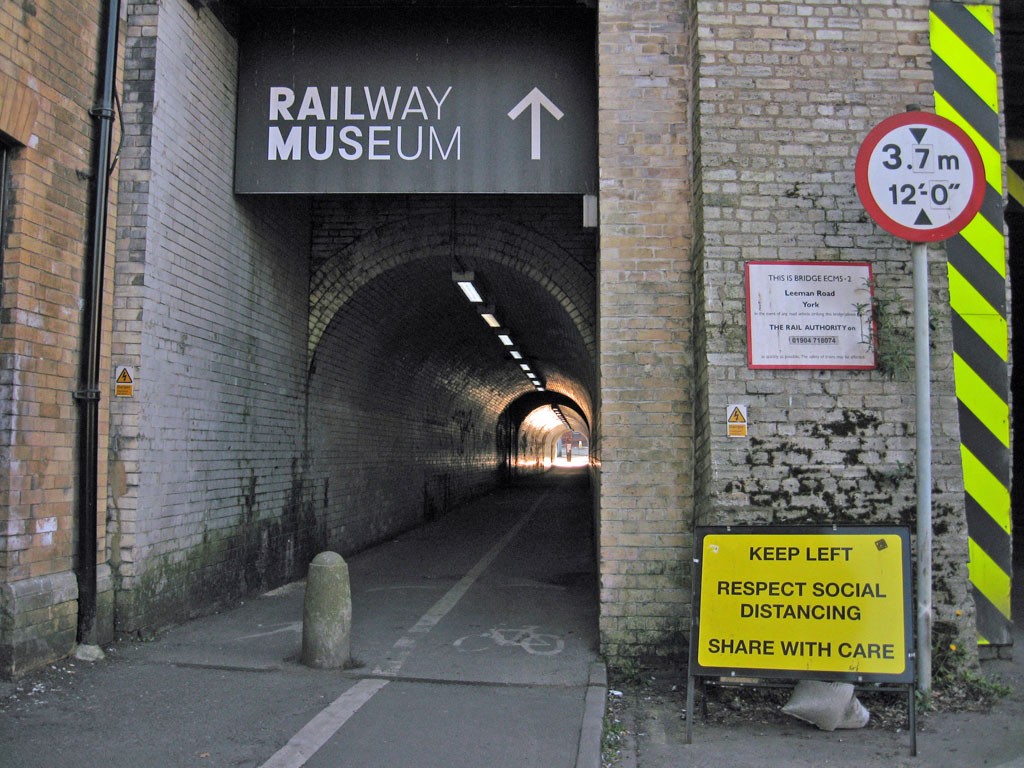
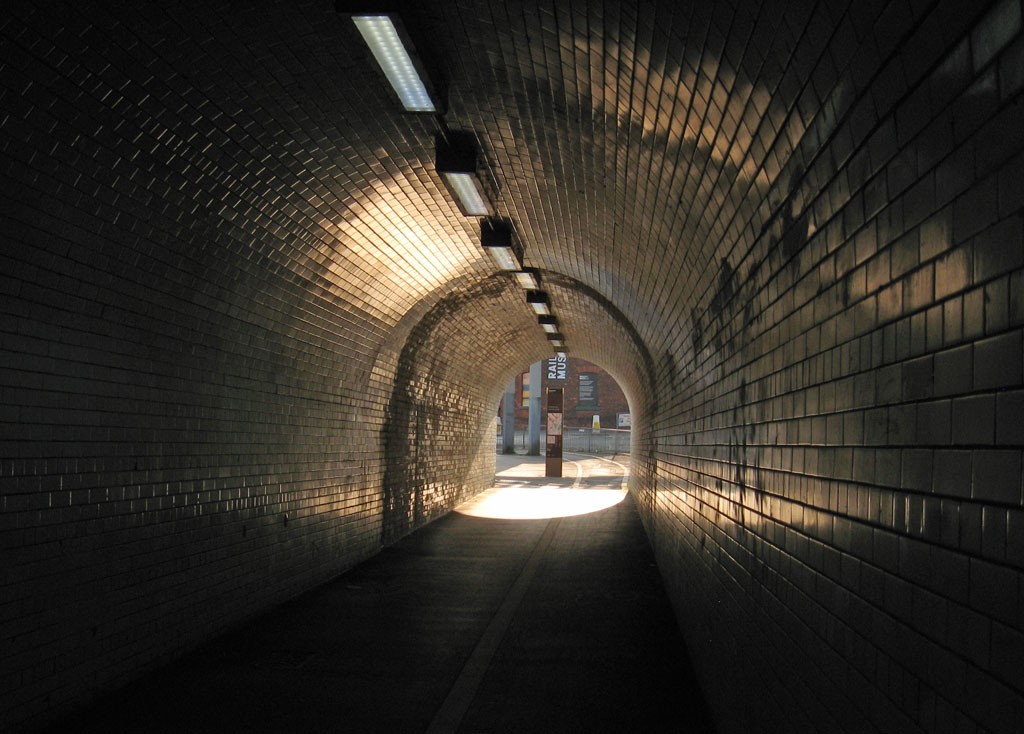
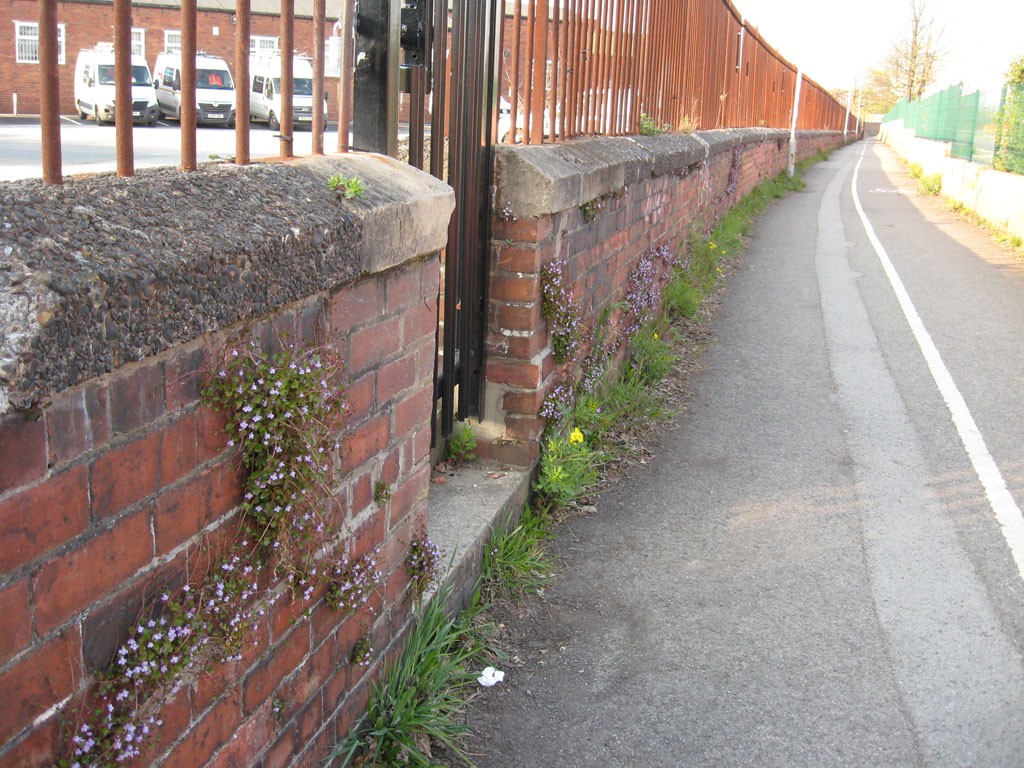
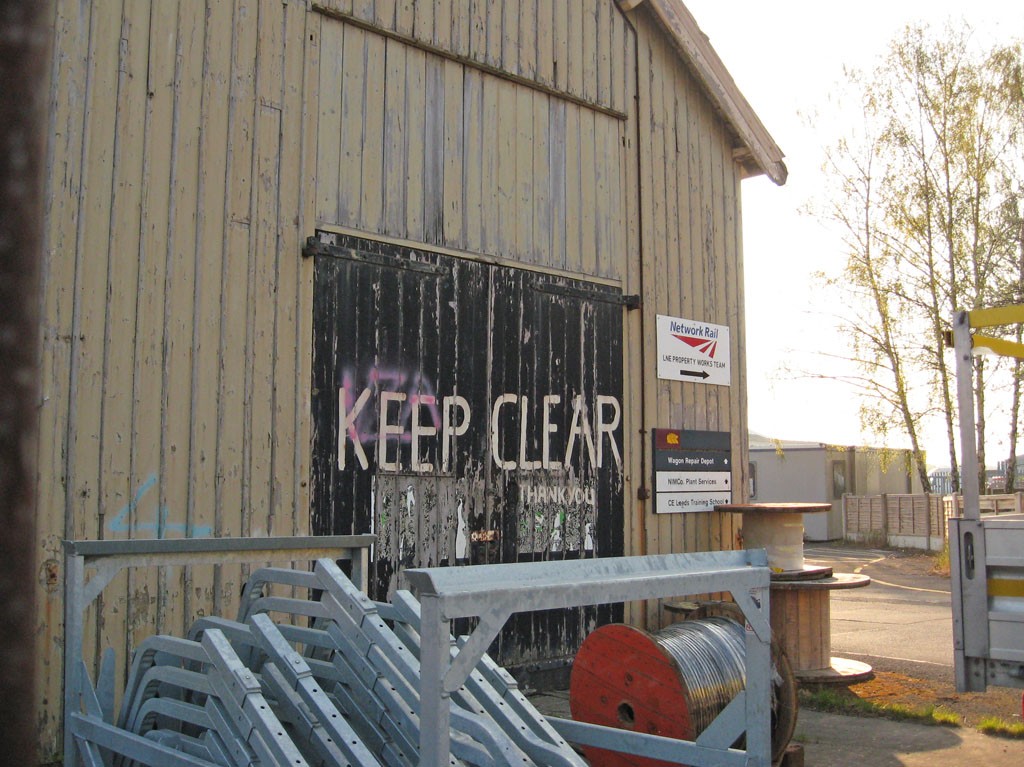
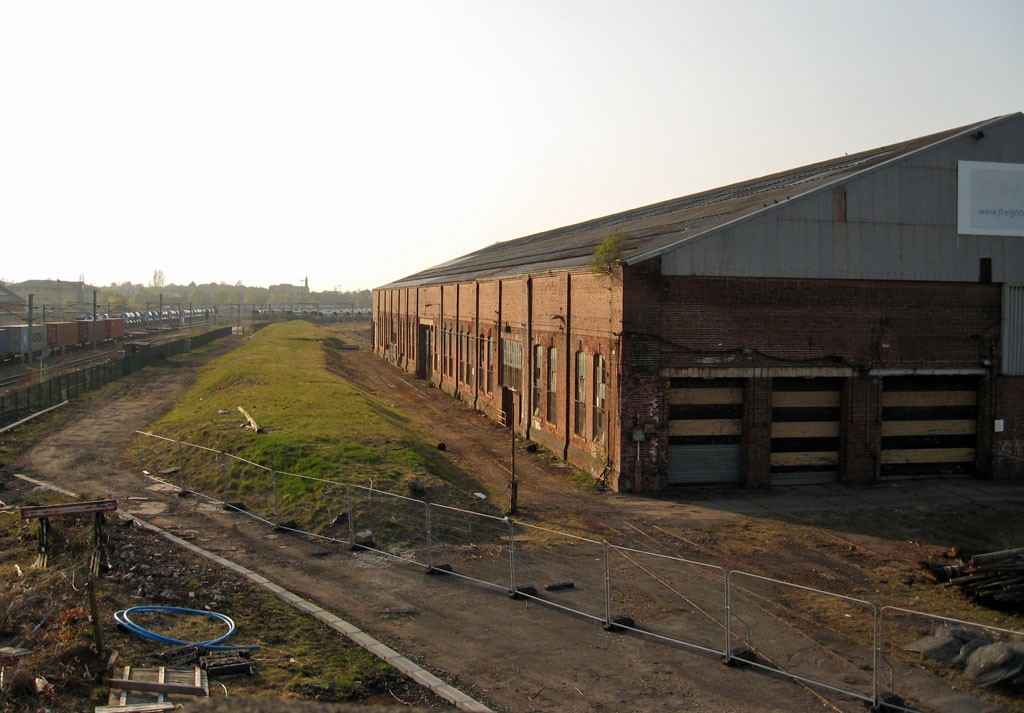
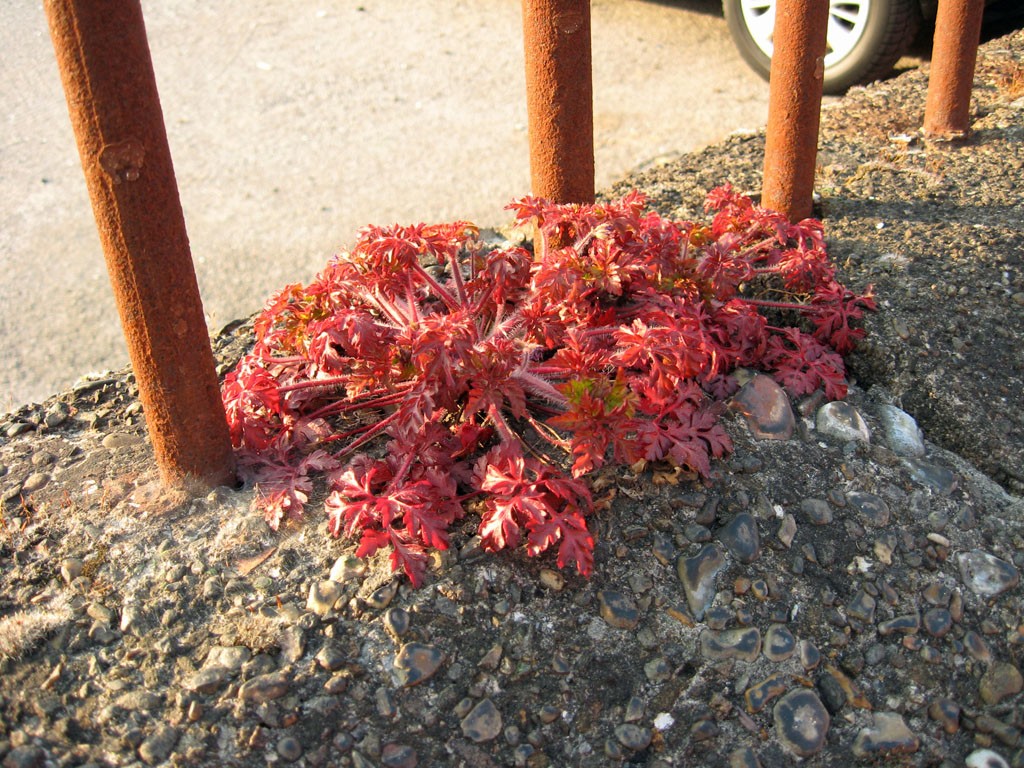
Lisa
Like yourself, I took a recent trip down the Cinder track to photographically record the old Wagon Works complex before it was lost forever. Living as a child on Upper St Paul’s Terrace, the Cinder Track was a regular route to town. I have over 60 years seen the huge changes in the area now known as York Central. In the sixties, both sides of the footpath were a hive of railway activity, a busy marshalling yard (Branches Yard) to the station side, where goods wagons were shunted by steam engines into formation to be taken to and along the many branch lines and village stations then emanating from York.
To the other side of the footpath there was the bustling goods depot, now part of the NRM, and nearer the footbridge various railway workshops, and the Wagon Works, the yard of which had a large gantry crane, and had a tall boiler chimney. Most of these workshops were rationalised, and then removed over the years, leaving just the Remnants of the Wagon Works.
There was much of interest to a railway mad small boy. I clearly remember the Fire House in it’s prime. Like most railway buildings at this time it was well maintained, and regularly painted in the two tone white and pale blue of British Railways. There was a large window facing the footpath, now partially boarded up. My Dad would lift me up onto the wall, and I would hold the railings to look inside. Everything within was immaculate, with varnished matchboarding, and red painted fire buckets hanging along one wall. The centrepiece though was what held my attention. A bright red fire pump trailer with highly polished brass fittings, and coiled fire hoses.
Exactly how much help this would have proved in a large works fire is not certain, but it impressed me.
I am so glad that this building may be saved, but am sad that owing to years of neglect and wantful vandalism more interesting industrial buildings in this area are no longer there to be saved.
David,
You seem to have a few years on me so I don’t remember the fire house being occupied as you described. It was probably the late 70’s before I went that way often enough to remember being lifted to see through the railings. By then the place was in decline and the vandalism was increasing, which was a shame.
I went to school in your area so perhaps you could confirm if the cattle docks behind the wall at St. Paul’s School were still going at the time – mid 70’s? I vaguely remember standing at the entry gate (near the church) and seeing the railings and I think some animal dung (or perhaps I recollect the smell and made that up). I never saw it in use, but I believe the cattle went from there to the old market near the barbican. I only remember a few oil tankers parked there and lots of train spotters “copping” a few locos. I remember seeing a few steam specials from that spot before it all got cleared out and palisade fencing installed, blocking the view.
Mathew
British Railways stopped carrying livestock in 1972. My family left Upper St Paul’s Terrace in 1968, the year steam traction also finished on British Railways.
I believe though that the cattle docks probably ceased to be used before 1972. I got married in 1984, and returned to Holgate, living for several years on Railway Terrace. By that time the cattle docks were abandoned and overgrown, later becoming a small housing estate which still stands.
As I recounted on York Stories several years ago, as a small schoolboy at St Paul’s in the sixties, we would be taken to the cattle docks to see the arrival of the large travelling Circus’s by rail, and watch the elephants being walked over Holgate Bridge and down to the Knavesmire where the big top was set up. An amazing sight.
David,
Thanks for the reply and for sharing the great story about the circus.
It would appear my memory is playing tricks! I think I started at St. Paul’s in 1973, the year I turned 5, and I would have only been that way before then to go to Sunday school at the church. We did walk past the old cattle docks every day for our school dinners as they were served in the hall on Dalton Terrace for the first few years I was at St. Paul’s. In those days the traffic was lighter on Holgate Road nut I doubt such a journey would be allowed today.
Hi David and Matthew – have located the earlier comment referred to, about the circus animals: see this link. It was on the page about the Capaldi’s ice cream van, where we were trying to establish the location – Capaldi’s ices – Carlo’s van, 1950s.
David, thanks for adding this, really appreciate your evocative description. The Fire House sounds quite something, lovely to read about it when it was smart and in use.
There is at least one other Cinder Lane in York, off East Parade in Heworth. Any others?